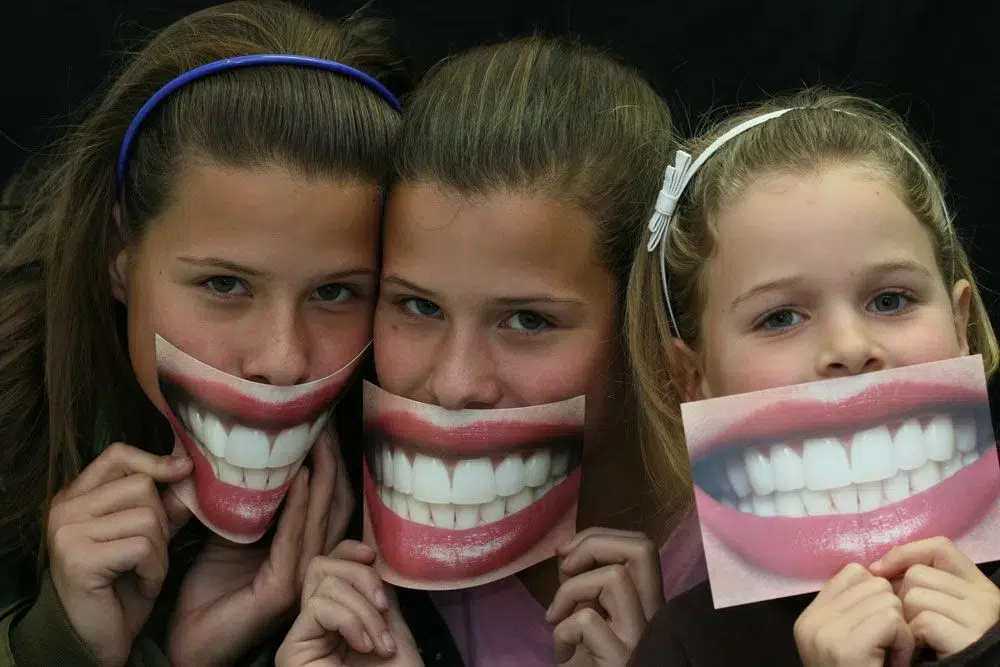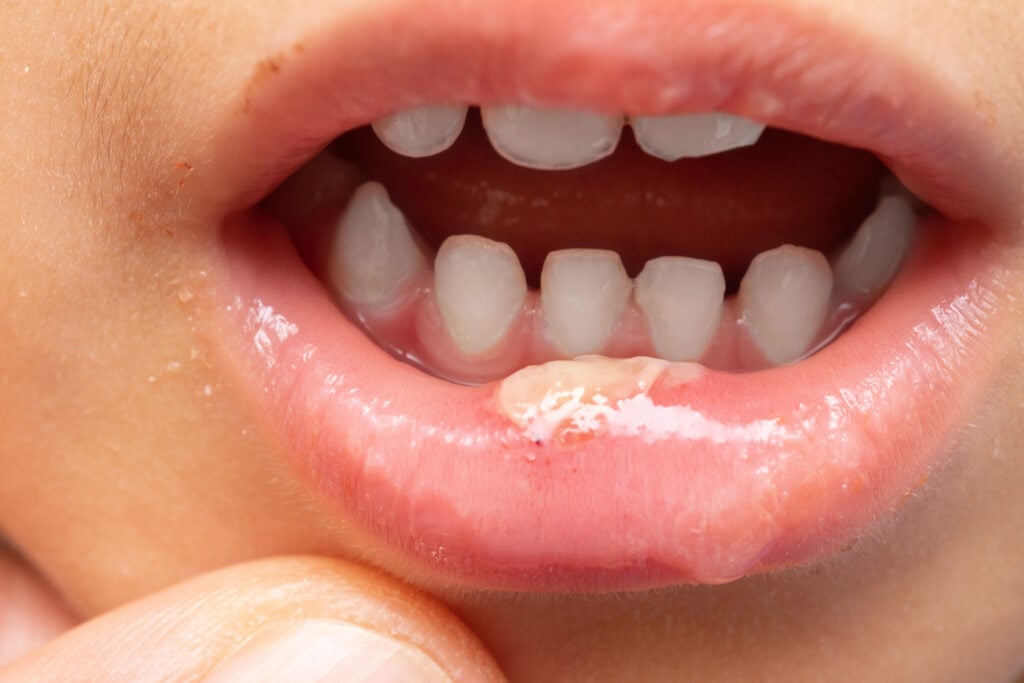Children and Oral Care

Tooth decay in children
Baby teeth are susceptible to decay as soon as they appear, leading to early childhood caries and potential complications.
Prolonged exposure to cariogenic liquids like milk, formula, fruit juice, and soda can cause decay.
Prevention is key! Follow these tips:
- Avoid letting your baby fall asleep with a bottle containing milk, formula, or juice.
- Start oral care early by gently wiping their gums after each feeding.
- Introduce tooth brushing with water as soon as the first tooth appears.
- Assist your child with brushing until they can do it effectively themselves.
- Regularly check your child’s teeth for visual signs of problems.
- Schedule their first dental check-up around their first birthday.
- Establish the habit of brushing your baby’s teeth twice a day using a soft-bristled toothbrush and water.
- Around age two, use a pea-sized amount of baby toothpaste once they can spit.

Why do we need to brush a baby’s teeth?
Despite children not consuming the same variety of foods as adults, bacteria still exists in their oral cavity. This bacteria produces acid, which attacks and erodes the tooth surface, leading to cavities. Even if your child resists brushing, it’s essential to persist and provide proper care with patience. Avoid being too rough, as minimal pressure is needed to remove bacteria and food debris. Over time, they will come to appreciate the gentle attention.
So, how should we brush effectively?
Allocate two to three minutes for each brushing session.
Teach your Child to Brush
To ensure effective brushing for your child’s teeth, follow these guidelines:

Habits that affect dental development - Thumb Sucking
Sucking is a natural reflex that brings comfort and security to infants, often inducing sleep. Most children naturally stop thumb sucking and pacifier use between the ages of two and four. However, problems can arise if these habits persist beyond the early years. Prolonged thumb sucking or pacifier use can lead to misaligned teeth, malformed jaws, and potential speech issues due to the lack of proper lip seal. The frequency, duration, and intensity of sucking determine the likelihood of these problems occurring.
Here are some tips to help address thumb sucking or pacifier use:
- Offer praise and rewards when your child refrains from sucking.
- Identify and address any underlying causes of anxiety or insecurity that may trigger sucking habits, such as improving the sleep environment.
- Wait for the right time to tackle the habit, considering your child’s readiness and willingness to cooperate. Dental appliances can be utilized to assist in breaking the habit.
- During your dental visit, our team can provide guidance to encourage your child to stop sucking and explain the potential consequences of continued habits.
Together, we can work towards helping your child overcome thumb sucking or pacifier use and promote a healthy dental development.
Prevention of dental issues in children - Regular Check-ups
Regular dental check-ups are often overlooked or postponed, but they play a crucial role in maintaining excellent oral health.
Prevention and early intervention are key to avoiding more extensive dental issues. Children who receive regular dental examinations and check-ups tend to experience fewer dental problems overall. In addition, any required treatments are typically simpler, leading to happier children and parents alike.
If it has been more than twelve months since your child’s last dental visit, we strongly encourage you to book them in for a comprehensive check-up, including a thorough cleaning and polishing. By prioritizing their dental health, you can ensure their smiles stay bright and healthy for years to come.

Fluoride Application
Fluoride is a valuable ally in promoting strong teeth and preventing tooth decay; it works by strengthening tooth enamel and providing protection against decay.
In Australia, most major cities have optimal levels of fluoride added to tap water. Extensive studies have demonstrated the long-term benefits of water fluoridation on dental health (Evans et al., Hsiau et al., Dennison et al., Patterson et al., Jalaludin et al.). Water fluoridation in the Blue Mountains, for example, has shown a reduction in the risk of dental decay (Aust Dent J., Arora et al.).
However, it’s worth noting that many children now consume bottled water, which typically lacks fluoride. While some bottled water may naturally contain fluoride, the amount is often insufficient for effective protection. Additionally, certain home water filters can remove fluoride from tap water.
When it comes to toothpaste, it’s essential to choose low fluoride toothpaste specifically formulated for children. Excessive fluoride intake during tooth development can lead to mild white marks or mottling on permanent teeth, a condition known as enamel fluorosis. It’s important to differentiate enamel fluorosis from other causes of enamel discoloration or malformation, such as childhood malnutrition, chronic illness, trauma, long-term medication use, or radiation therapy.
By understanding the importance of fluoride and making informed choices regarding water consumption and toothpaste selection, we can promote optimal dental health for our children while minimizing the risk of enamel fluorosis.
To prevent dental fluorosis
Fluoride is a valuable ally in promoting strong teeth and preventing tooth decay; it works by strengthening tooth enamel and providing protection against decay.
In Australia, most major cities have optimal levels of fluoride added to tap water. Extensive studies have demonstrated the long-term benefits of water fluoridation on dental health (Evans et al., Hsiau et al., Dennison et al., Patterson et al., Jalaludin et al.). Water fluoridation in the Blue Mountains, for example, has shown a reduction in the risk of dental decay (Aust Dent J., Arora et al.).
However, it’s worth noting that many children now consume bottled water, which typically lacks fluoride. While some bottled water may naturally contain fluoride, the amount is often insufficient for effective protection. Additionally, certain home water filters can remove fluoride from tap water.
When it comes to toothpaste, it’s essential to choose low fluoride toothpaste specifically formulated for children. Excessive fluoride intake during tooth development can lead to mild white marks or mottling on permanent teeth, a condition known as enamel fluorosis. It’s important to differentiate enamel fluorosis from other causes of enamel discoloration or malformation, such as childhood malnutrition, chronic illness, trauma, long-term medication use, or radiation therapy.
By understanding the importance of fluoride and making informed choices regarding water consumption and toothpaste selection, we can promote optimal dental health for our children while minimizing the risk of enamel fluorosis.

Fissure Sealants
Sealants play a crucial role in preventing childhood tooth decay. They are a fluid material that hardens, resembling plastic, once applied to the chewing surfaces of adult molar teeth.
The process of sealant placement is simple, painless, and does not require a local anesthetic.
The pits and fissures on teeth can be challenging to clean effectively, leading to plaque buildup and eventually cavities. Sealants are designed to minimize food traps in these hard-to-clean areas. However, it’s important to note that not all children require fissure sealants, as some may have shallow pits and fissures or exceptional oral hygiene practices.
Typically, sealants are most commonly placed on the first and second adult molars, which typically erupt around the ages of 6 and 12 respectively. It is recommended to consider sealant placement around these ages.
By discussing sealants with our dental professionals, we can determine if they are suitable for your child’s specific needs and provide guidance on maintaining optimal oral health for a cavity-free smile.
What our Clients Say!
I've been a customer of Designer Smiles for over 20 years and I cannot say enough good things about them! From the moment you walk into the office, you are greeted with a warm and friendly atmosphere that immediately puts you at ease. The staff is knowledgeable, professional, and caring. They use the latest technology and take the time to explain everything. I highly recommend them!
Dr Sarkis is the maestro of cosmetic dentistry….for years I suffered with 2 slightly darker front teeth due to a childhood accident. I’ve had composite veneers before but nothing compared to the composite veneers Dr Sarkis did……now I feel so confident smiling again……Dr Sarkis I can’t thank you enough…
Quite literally the best dentist I’ve been to in a lifetime. Dr Natasha Koelmeyer specifically is just a wonderfully kind and gentle Doctor. Must also mention that the head specialist here is also second to none. Their knowledge (goodness they know their stuff) their approach, their kind and gentle manner - my daughter actually enjoys going to the dentist. They’ve got a really considered patient centric mentality. I wouldn’t go anywhere else, every single person there including the reception staff is a star. Thank you Designer Smiles!
My journey with Dr Sarkis began about 10 years ago. I did not realise that I had lacked self confidence and shone away from "my true smile". Dr Sarkis was honest, reassuring and professional throughout my process and not only was he able to achieve that perfect smile but achieve same without compromising the health of my teeth and gums.The ongoing care at Designer Smiles is 5 star whether it is a routine check, clean minor or major dentistry. Thank you Dr Sarkis and also your team.
I found Designer Smiles from one of their YouTube videos showcasing the Icon treatment to fix white spots on teeth. Dr. Sarkis Nalbandian's consultation provided me with a thorough plan and showed me how their practise could give me predicable results for my concerns. I knew I was in safe hands. I had Kristy Gupta perform both of my procedures and she was very professional and so kind. I am very happy with my results!
I cannot express how grateful I am for Sarkis and the team at Designer Smiles. Around 11 years ago my life changed when Sarkis first transformed my smile with composite veneers. This month, with my original teeth in tact I returned to have my composite veneers upgraded to porcelain. I was amazed that Sarkis and his team could do this without an injections, no pain and whilst still keeping my original teeth in tact. I absolutely love the result and I would highly recommend that anyone that is unhappy with their smile in any way, must visit designer smiles
Started my treatment with the team at Designer Smiles in 2019. Had other dental treatments including Maxillofacial, expanders, straightening and gum grafting but out of all the procedures and surgeries Dr. Sarkis was the key as he was applying the ‘finishing product’ which included composite veneers. I am gobsmacked by the incredible job done. He talks the talk and definitely walks the walk. And his support team there are simply incredible and make you feel part of a family not just another dental clinic to take your money. Can not recommend highly enough. Customer for life here!!
Get In Touch
Mon to Fri: 8.00AM-5.00PM
Sat-Sun: Closed

